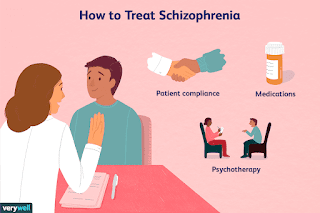What is Schizophrenia-
Schizophrenia is a chronic mental disorder characterized by a range of cognitive, behavioral, and emotional symptoms. It can significantly impact a person’s ability to think clearly, manage emotions, make decisions, and relate to others. Here is a detailed overview of schizophrenia:
Symptoms:
1. Positive Symptoms:
– Delusions: False beliefs that are resistant to reasoning or contrary evidence.
Thought Disorders: Disorganized thinking, as seen in disorganized speech and impaired communication.
– Movement Disorders: Agitation, restlessness, or repetitive movements.
2. Negative Symptoms:
Anhedonia: Lack of interest or pleasure in activities.
Avolition: Decreased motivation to initiate and sustain activities.
Social Withdrawal: Difficulty establishing and maintaining relationships.
3. Cognitive Symptoms:
Impaired Memory: Difficulty with memory and attention.
Executive Dysfunction: Problems with planning, organizing, and completing tasks.
Causes:
2. Neurochemical Factors: Imbalances in neurotransmitters, such as dopamine, glutamate, and serotonin, are believed to play a role.
3. Brain Structure and Function: Structural abnormalities in the brain, especially in the frontal and temporal lobes, have been observed in people with schizophrenia.
4. Prenatal Factors: Exposure to certain viruses, malnutrition, or stress during pregnancy may increase the risk.
Diagnosis:
Diagnosing schizophrenia involves a comprehensive assessment, including interviews with the individual, family history, and a review of symptoms. The Diagnostic and Statistical Manual of Mental Disorders (DSM-5) is often used by mental health professionals for diagnosis.
Treatment:
1. Medication: Antipsychotic medications are commonly prescribed to manage symptoms. These medications work by influencing neurotransmitter levels, especially dopamine.
2. Therapy: Cognitive-behavioral therapy (CBT), family therapy, and supportive therapy can be beneficial in helping individuals cope with symptoms and improve functioning.
3. Hospitalization: In severe cases or during acute episodes, hospitalization may be necessary to ensure safety and provide intensive treatment.
Prognosis:
Schizophrenia is a chronic condition, and the course varies among individuals. With proper treatment and support, many people with schizophrenia can lead fulfilling lives. However, relapses can occur, and ongoing treatment is often necessary.
Challenges:
– Stigma: There is a significant societal stigma associated with schizophrenia, which can lead to discrimination and social isolation.
Co-occurring Conditions: Individuals with schizophrenia may also experience co-occurring conditions, such as substance abuse or depression.
Early intervention and a comprehensive, individualized treatment approach are crucial for managing schizophrenia effectively. It is essential for individuals with schizophrenia to receive ongoing support from mental health professionals, family, and the community.
https://www.womaniyas.com/2024/01/acquired-immunodeficiency-syndrome-aids.html

.JPG)
.JPG)
.JPG)
